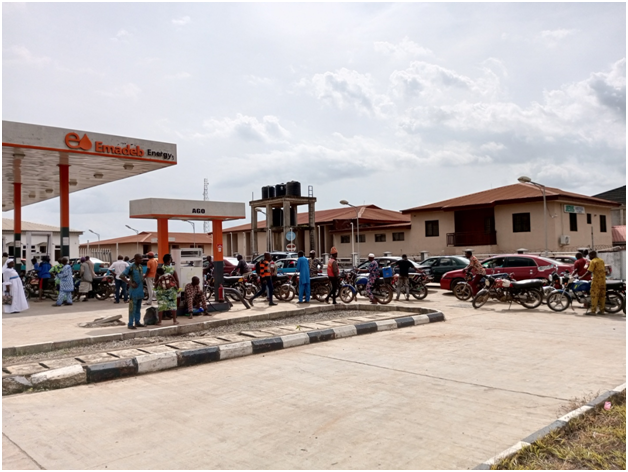Legal implication of NNPC under CAMA
By Runsewe Solomon & Damilola Akinmolayan
|
Recently President Muhammadu Buhari directed that the Nigerian National Petroleum Company Limited NNPC, be incorporated under the Company and Allied Matters Act. The Hope Classics spoke with some legal practitioners and some experts on the issue; Excerpts.

There is a strong indications, and it signals the dawn of a new era; an era in which restructuring and transformation could address many of the issues that have dominated the oil and gas industry in Sub-Saharan Africa’s second-biggest economy.
The Petroleum Industry Act, PIA, seeks to increase governments revenue from oil, and as well lay down a strengthened legal and regulatory framework for the Nigerian oil industry, set up structures for the establishment of commercially driven petroleum entities; and promote transparency in the administration of Nigerian petroleum resources. Succinctly put, I think the bill seeks to address the problem of administering petroleum resources in line with global best practices, and to provide for efficient and independent sector regulation.
The extant regulatory framework of the oil and gas sector which includes the Ministry of Petroleum Resources, NNPC Act 1997, the Petroleum Act 1969, the Oil and Pipelines Act 1990, the Petroleum Profit Tax Act 1959, the Petroleum Products Pricing Regulatory Act 2003 amongst others have had more ruinous effect on the oil and gas sector, as they have not promoted a culture of transparency in the oil and gas sector. They have also not created the right opportunities to tackle gas flaring, oil spillage and Illegal bunkering in Nigeria.
The Minister of Petroleum is empowered to formulate, monitor and administer government policy in the petroleum industry; exercise general supervision over the affairs and operations of the petroleum industry in accordance with the provisions of this Act; report developments in the petroleum industry to the government; represent Nigeria at international organizations on petroleum matters; promote an enabling environment for investment in the Nigerian petroleum industry; negotiate treaties or other international agreements on matters pertaining to petroleum on behalf of the Government, shall have rights of pre-emption of petroleum and petroleum products marketed under any license or lease, in the event of a national emergency.
This commission is to administer and enforce policies and regulations relating to all aspects of upstream petroleum operations and also to issue, administer and enforce compliance on the issuance of licenses and leases in the upstream sector. It is also to establish, monitor, regulate, and enforce health and safety measures relating to all aspects of upstream petroleum operations, publish reports and statistics on the upstream sector, validate and certify the evaluation of national hydrocarbon reserve, manage and administer all upstream petroleum data for all unallocated acreage.
This Commission on the approval of the minister, is to allocate petroleum production quotas, and develop cost benchmarks for upstream petroleum operations performance amongst other functions, as laid out in the bill.
This authority is to administer and enforce policies, laws and regulations relating to all aspects of midstream and downstream petroleum operations, and to issue and administer licenses in the midstream and downstream sectors.

The new bill, which seeks to reform the way in the oil industry is regulated and funded, proposes the dissolution of the national oil company, Nigerian National Petroleum Corporation (NNPC), and the Petroleum Products Pricing Regulatory Agency (PPPRA).
According to Section 54 (1, 2 and p3 ) of the bill, the Minister of Petroleum, together with the Minister of Finance, will incorporate the Nigerian National Petroleum Company Limited and transfer the assets, interests and liabilities of NNPC to NNPC Limited or its subsidiaries.
NNPC shall cease to exist after its remaining assets, interests and liabilities other than its interests, assets, and liabilities transferred to NNPC Limited or its subsidiaries under subsection 1 of this section shall have been extinguished or transferred to the government,” the bill reads in part.
According to Section 53 of the bill, the incorporation of NNPC Limited under the Companies and Allied Matters Act will be done “within six months from the commencement of this Act.” The bill says, “Ownership of all shares in NNPC Limited shall be vested in the government at incorporation and held by the Ministry of Finance incorporated on behalf of the government.

There is a new table that’s being created by the PIA. We have not yet studied the PIA. So, we are not aware, let alone being ready for the new developments that will come in from the PIA.
Anyone giving the President or the NNPC advice now is not on top of issues. NNPC is to be more transparent now than in the past.”
Recently, Kyari, had said the apex oil company will serve as a holding company for all its subsidiaries in the post Petroleum Industry Act, PIA era.
So, these shareholders can decide, as the law provides that over time, they can reduce the shareholding into some private shareholding. That means it can be floated subsequently as a company that is quoted on the stock exchange. The intention at the very onset is not to go to that step but there is provision in the law that allows us ultimately to sell shares of this company.
This is very simple. This company will pay taxes and royalties, which are revenues that accrue to the federation. So every part of this country and every sub national institution or government will benefit from it.
Secondly, this company will pay company income tax that also comes to the federation for the benefit of all. So, what is different is that this company will now have profit to make and declare dividend, which will be decided by the board of directors of this company.”
Kyari, who commended the legislators for providing three per cent of the budget of oil companies for the development of host communities in the PIA, added: “The very reason that they don’t have a stake is that till now, we have failed as a system to make sure that those values that should have come and many other interventions did not get to them.

The President has power to appoint as long as the government owns 100 per cent. Government, however, is defined in PIA glossary as the federal government. But the shares by Ministry of Petroleum Inc and Ministry of Finance Inc are held on behalf of the federation.”
My immediate reaction is simple. This looks more like a political board. It is a reappointment of those that are currently on the NNPC Board apart, perhaps, from Araraume.
However, as long as investors have confidence in the new Board, We are good. The likelihood is very low. So it seems government has made up its mind to continue to fund NNPC.
Time will tell. We can beg to take a clue from these appointments for the other Boards as documented in PIA Section 59. We should also pay attention to paragraph 59(f), in case there is room for further cerebral dialogue.
First, where are the Articles of Incorporation of the new NNPC Limited that this board will run transparently?
Second, the core objective of PIA with respect to NNPC Limited is to establish the framework to create a commercial institution that is profit oriented. Can this political board deliver?
Third, NNPC Limited has no Companies and Allied Matters Act, CAMAC registration number yet, does it? I guess this may be just being an extension of the life of the old board. It seems then that NNPC Limited, which is yet to be registered, is a new wine in an old wine cloth.
Perhaps, I am still caught up in what ought to be cloud. I beg for forgiveness.

The Presidential assent of the bill to PIA 2021 marked the beginning of the journey towards a competitive and resilient petroleum industry that would attract investments to support the nation’s Economic Recovery and Growth Plan.
The PIA 2021 creates a regulatory environment that would ensure efficiency and accountability across the oil and gas value chain and reposition NNPC to a commercially driven National Petroleum Company that is accountable to the Federation.
The Act also provides for a direct benefit framework that will enable sustainable development of Host Communities. I appeal to the host communities to look carefully at the contents of the Bill which in the implementation will bring real and lasting benefits to them.
Furthermore, the Act provides for deliberate end to gas flaring which would facilitate the attainment of Nigeria’s Nationally Determined Contributions of the Paris Agreement through a funding mechanism to support gas flare out project in host communities.

NNPC is the State oil corporation which was established April 1, 1977 and through which the federal government of Nigeria regulates and participates in the country’s petroleum industry and it is one of the government sectors saddled with the responsibility of oil exploration, sales and other regulations incidental to oil production in Nigeria.
The principal law governing the Nigerian petroleum industry is the Petroleum Act of 1969 which is outdated because so many things were not incorporated into the Act as at then, due to so many rumblings and rancours, it becomes necessary to formulate another enactment, hence, Petroleum Industry, Act (PIA), was enacted and accented to in 2021 by President Buhari, this will necessitate the unbundling of NNPC. PIA suggests that the management of the oil sector will be incorporated like any other companies in line with the provisions of Companies and Allied Matters Act (CAMA), which is as well spelt out by Corporate Affairs Commission (CAC). PIA proposes that the host oil communities are captured in the affairs of oil exploration and upon incorporation, there is going to be three (3) sectors viz: upstream, the midstream and the downstream sectors and one of the effects of PIA is that the Act encourages investors to refine crude oil locally. Legal implications of the incorporation of NNPC.
It will lose its old status as a result of unbundling. It will be deemed as a legal entity i.e. that as power to sue and be sued. Private individuals can subscribe as shareholders of the company. By Section 57 of the Petroleum Industry Bill (PIB), the effect of the restructuring on the employees of the Corporation of NNPC Limited, all employees of NNPC are deemed employees of NNPC Limited and the terms and conditions of their employment must not be less favourable than when they were in NNPC. Upon the unbundling, they may likely lose their jobs – this is the negative effect of incorporation.

The Petroleum Industry Act (PIA) is expected to have far-reaching effect in the oil industry. The Nigerian oil and gas industry lost as much as $50 billion worth of investments in 10 years as a result of the lack of PIA. Now, the situation will change. Hopefully, the Act will revolutionise the nation’s oil sector and attract more investments in the sector.
For instance, it will lead to the commercialisation of the Nigerian National Petroleum Corporation (NNPC). Section 53 (7) (8) of the law provides that the NNPC Limited must declare dividends and also pay all fees, rents, royalties, profit oil share taxes and some other requirements.
Besides, the PIA has provided the legal, governance, regulatory and fiscal framework for the industry as well as the development of the host communities. It will hopefully engender the return of transparency and openness to the oil sector.











LEGAL CONSEQUENCES OF NNPC TRANSITION TO A COMPANY LIMITED BY SHARE: – Entertainment & News
03rd Aug 2022[…] Legal implication of NNPC under CAMA | The Hope Newspaper […]